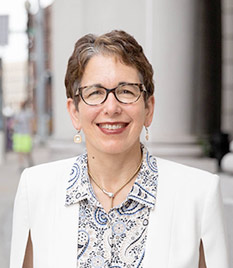I can’t think of a time when it has been more important to talk about diversity, inclusion, and social justice at this University. Tragedies that continue to take place across the country involving the killing of black men – most recently in Tulsa, Okla., and Charlotte, N.C. – are causing anguish, not just in those cities so deeply affected by the incidents, but also right here on Suffolk’s campus. The pain is particularly acute for many of our students, faculty, and staff of color, and that can be made worse by silence.
So I want to take this moment to reiterate Suffolk’s commitment to working toward a more just world, as well as a more inclusive campus environment. As a University, we need to recommit daily to doing all that we can to eliminate injustice, inequality, and all forms of racism in this country. That includes using our expertise and teaching platform to address inequity, intolerance, and violence in our society.
It is also critical that we do more to make sure that our own community is as inclusive as we aspire to be and to ensure that all members of the Suffolk community feel safe and supported. I want to provide a few updates on some of the work being done on that front.
Diversity Task Force Open Forum
I will be speaking briefly next week at an open forum that we hope will offer an opportunity for sharing and healing. Micky Lee, associate professor in the Communication & Journalism Department, has taken over as chair of the Diversity Task Force and will provide a brief update on the work of the group and discuss support and resources. The remainder of the forum will be devoted to a training session on microaggressions and implicit bias. The session originated from students wanting to create more awareness, including amongst faculty and staff, of microaggressions, those often subtle verbal and non-verbal slights, snubs or insults, whether intentional or not, that send hostile or derogatory messages.
Faculty Forums
This year the Center for Teaching and Scholarly Excellence has launched a series of faculty forums on “Leveraging Diversity and Navigating Identity.” A three-part workshop will address the roles of diversity and identity in the classroom through exploration of how they can impact a student’s learning experience. The workshop series also will provide opportunities to learn more about teaching methods faculty can use to leverage diversity and promote equity in the classroom.
Climate survey
Working with the Diversity Task Force, we are preparing a climate survey, which will be sent to all Suffolk employees and students in mid-October. The goal of the survey is to determine how members of our community feel about the current climate and to what degree we are inclusive and supportive. Before we can address our challenges, we need to understand them better from the perspectives of all our constituencies.
There will be questions that examine to what degree faculty, staff, and students feel included based on disability status, sexual orientation, race/ethnicity, religious beliefs, political beliefs, age, sex, gender identity/expression, socio-economic status, and veteran status. The survey results will help guide our diversity and inclusion agenda.
Finally I think it’s important that the University continue to do more to foster regular dialog around race, diversity, and inclusion. Too often it is horrible and heart-wrenching tragedies that drive our response. What can we do to be more proactive? Should we have more forums led by students? Teach-ins? What are your thoughts?
Ensuring that all of us – students, faculty, and staff – feel part of a safe and inclusive environment is core to who we are as a University. I invite you to respond with your ideas about how we best foster that environment here at Suffolk and beyond.

Marisa J. Kelly
Acting President





Leave A Comment
I welcome two-way communication with the Suffolk Community. Faculty, staff, and students are encouraged to respond to posts, exchange ideas, share opinions, and offer feedback by logging in below using your regular Suffolk login (without "@suffolk.edu"). Comments should be made in accordance with standards of civil discourse, and we reserve the right to delete derogatory or inappropriate comments. log in